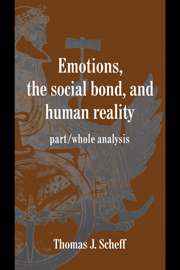Appendix
Published online by Cambridge University Press: 22 October 2009
Summary
Verbal markers
Shame:
alienated: rejected, dumped, deserted, rebuff, abandoned, estranged, deserted, isolated, separate, alone, disconnected, disassociated, detached, withdrawn, inhibited, distant, remote, split, divorced, polarized.
confused: stunned, dazed, blank, empty, hollow, spaced giddy, lost, vapid, hesitant, aloof.
ridiculous: foolish, silly, funny, absurd, idiotic, asinine, simple-minded, stupid, curious, weird, bizarre, odd peculiar, strange, different, stupid.
inadequate: helpless, powerless, defenseless, weak, insecure, uncertain, shy, deficient, worse off, small, failure, ineffectual, inferior, unworthy, worthless, flawed, trivial, meaningless, insufficient, unsure, dependent, exposed, inadequate, incapable, vulnerable, unable, inept, unfit, impotent, oppressed.
uncomfortable: restless, fidgety, jittery, tense, anxious, nervous, uneasy, antsy, jumpy, hyperactive.
hurt: offended, upset, wounded, injured, tortured, ruined, sensitive, sore spot, buttons pushed, dejected, intimidated, defeated.
Anger
cranky, cross, hot-tempered, ireful, quick-tempered, short fuse, enraged, fuming, agitated, furious, irritable, incensed, indignant, irate, annoyed, mad, pissed, pissed off, teed-off, upset, furious, aggravated, bothered, resentful, bitter, spiteful, grudge (the last four words imply shame-anger compounds).
Other verbal markers
Shame
Mitigation (to make appear less severe or painful); oblique, suppressed reference, e. g. “they,” “it,” “you”; vagueness; denial; defensiveness; verbal withdrawal (lack of response); indifference (Acting “cool” in an emotionally arousing context).
Anger:
interruption; challenge; sarcasm; blame
Shame-anger: Temporal expansion/condensation or generalization (“you always…,” “you never …”). Triangulation (bringing up an irrelevant third party or object).
Paralinguistic markers
Shame
(vocal withdrawal/hiding behaviors, disorganization of thought): over-soft; rhythm irregular; hesitation; self interruption (censorship); filled pauses (-uh-); long pauses (); silences; stammer; fragmented speech; rapid speech; condensed words; mumble; breathiness; incoherence (lax articulation); laughed words; monotone.
- Type
- Chapter
- Information
- Emotions, the Social Bond, and Human RealityPart/Whole Analysis, pp. 233 - 235Publisher: Cambridge University PressPrint publication year: 1997



